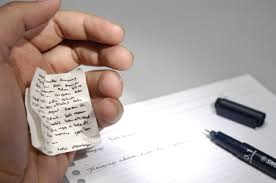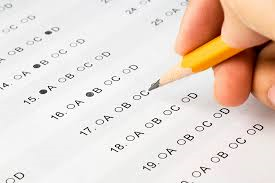Inside the Cheater’s Mind: Why do students cheat
 Why Students Cheat in the First Place
Why Students Cheat in the First Place
I’m sure your first answer would include students being lazy, reckless, in love, not interested in the subject matter, driven crazy by exorbitant test demands, etc. But what if cheating is a natural thing and could be much less condemned?
Imagine your first day at work as, let’s say, a UX designer. You’ve just graduated, have a tiny portfolio and are ready to learn and work hard in order to become “The Guy” that can create the most user-friendly and good-looking interfaces at the same time.
So, your boss gives you a small task to create a mockup of a web application interface which you’ve never done before. He also expects you not to bother your colleagues even if you have questions and… suddenly disappears. You have a task, a deadline, and nobody to answer your questions. What would you do? I bet you would probably try one of the things that your college professors claimed to be called “cheating”: going online to ask questions you have, studying the topic with the resources you have or even calling/messaging a friend of yours that has deep knowledge in the field.
Pretty normal situation, huh? This happens because the circumstances described above are much closer to real life than sitting in a classroom and being watched by college “hellhounds”. The thing is that we do not live and work in isolation, but we do contact data sources all of the time and it would be strange to ignore them instead of using them.
For those who doubt the fact it’s natural and something anyone should do, I’d like to admit that it’s totally ok to certain extent only. Of course, you wouldn’t want your doctor to stop during your surgery for a “quick lookup in Google, just to make sure”. Just bear in mind, extremes have never been the subject of this text.
How Technology Helps Students Cheat
According to a survey conducted by HigherEd Morning, UK students use the following tech methods: 26% of the cheaters record information on their phone and scan it during the exam, 25% send text messages to their friends and ask them for answers, 17% take pictures of exams sheets and forward it to friends, 20% are looking for answers on the Internet using their cell phones, 48% warn friends about the upcoming verification phone call or text. What is even
more interesting, almost 25% of students do not consider all this to be actual cheating process, they simply call it “help.” And even greater part of scholars overuses Internet during their exam sessions. 52% admitted that they were engaged copying Internet data in one way or another. At the same time 36% do not consider downloading a paper from web to be a serious violation, and 42% think that copying from the Internet is a slight college rules breach at worst.
Along with these tech methods, students also use good old proven ways of cheating. They write answers on the labels of bottles with a drink. The text is applied to the inner side and is visible only when viewed through the bottle.
How to Prevent Students from Cheating
Teachers should strongly discourage cheating in terms of copying other student’s answers or recklessly rewriting data from the pre-made cribs. It would be much better to create a supportive environment for students where can use sources of information that are available in real-life workplaces and situations.
To avoid the only negative impact of such strategy (an image that you don’t have to learn, research or memorize anything since you can always look it up) it’s important to set time limits that would not allow the students to learn something from the scratch, but to widen their knowledge or find a more favorable solution to the problem.
Some Thoughts Teachers Could Consider
Since students are not committed to learning, as well as alienated from what they do in school, they could be not interested in the type of material offered by teaching staff. It’s extremely important to avoid those methods of “traditional teaching” that deny any personal point of view a  student can have making them adapt to the attitudes and expectations of their professors.
student can have making them adapt to the attitudes and expectations of their professors.
One of the key employees of Freelance House, Alison James, describes cheating as “natural result of forcing alumni to be under unrealistic circumstances instead of demonstrating them different real-life oriented situations when using out-of-the-classroom information source can be extremely helpful and simulating the situations when it’s 100% unacceptable”.
It is also worth remembering that the students are trying to hold the data in their head for a long time, and then, after passing the exam, completely forget every single piece of it. Because of this, knowledge assessment loses purpose and meaning. Those who are in favor of keeping them going (and are against cheating), simply do not understand it. A common exam workflow suggests that students perceive knowledge as something only needed when a test is being carried out. It completely devalues education as it is, so, why not change the status quo and see where it gets us?
